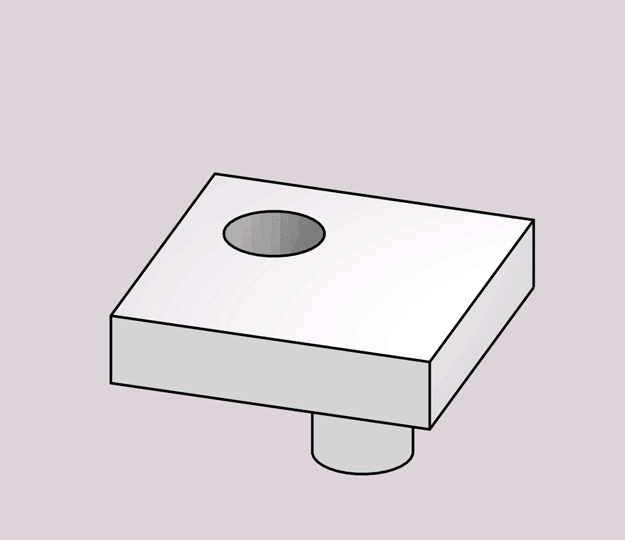
DAT PAT Guide
Top-front-end (TFE) Questions
What is a TFE problem?
TFE problems are the second group of problems that appear on the perceptual ability test (PAT) of the dental admissions test (DAT) and comprise Items 16-30. For each TFE problem, you will be shown two views of an object (top view, front view, and/or end view) and you have to determine the missing view. Solid lines represent visible edges, and dotted lines represent hidden edges, from each view.

The views given are without perspective. That is, the points in the object are viewed along parallel lines of vision in all views shown.
The TOP view is the projection looking DOWN on the object, the FRONT view is the projection looking from the FRONT to the back of the object, and the END view is the projection looking from the RIGHT side of the object to the left side. And, the views are always shown in the same part of the answer image: the TOP view is shown in the upper left corner, the FRONT view is shown in the lower left corner, and the END view is shown in the lower right corner.

Edges that are VISIBLE from a given perspective are shown with SOLID lines. On the other hand, edges that cannot be seen, or are HIDDEN, from a given perspective are shown with DOTTED lines. For instance, if there were a hole through the top of the object, its edges would be visible from the top view (and therefore depicted by solid lines). Its edges would not be visible from the end and front views (but their positions would be depicted by dotted lines in these views).

Note: Directions given on test day may be formatted differently, but objectives are the same.
Example problem
Here is a typical TFE problem you’d encounter on your DAT, along with an Erudition-style explanation to help you understand how to solve it.

Below is an overview of the object, with some key features highlighted. Notice that the object is a flat square board with a cylindrical hole running through it and a cylindrical protrusion attached to the bottom of the board. You can see here that the front view matches Choice C.


You can tell from the solid lines in the top view that a circular feature sits to the back and left on the object. And you can see from the dotted lines in the end view that it is a hole that goes through the object. This is depicted in the front view as dotted lines on the left side of the object.

You can tell from dotted lines in the top view that a circular feature sits to the front and right on the object. And you can see from the end view that it is a cylinder that extends down from the bottom of the object.

A: This choice shows the hole on the right side of the object and the cylinder on the left. However, the top view shows that the hole sits on the left side, and the cylinder sits to the right.

B: This choice shows a cylinder extending out the top of the object and the hole sitting on the right side of the object. However, the dotted lines in the end view show that the circle in the top view is a hole. And, the dotted circle in the top view shows that the feature on the right of the object is obscured from view and not a hole.

D: This choice shows cylinders extending out of the top and bottom of the object, and it’s missing a hole through the board. However, the dotted lines in the end view show that the solid circle in the back of top view is a hole.

TFE tips & strategies!
Make sure that components of the TOP and FRONT view have the same WIDTH and left-right positioning.

Make sure that components of the TOP and END view have the same DEPTH.

Make sure that components of the FRONT and END VIEW have the same HEIGHT.

Make sure to account for ALL edges on an object and their relative positions. Make sure that hidden edges are represented by dotted lines, and vise versa.

If an object looks complicated, simply break it into its components and make sure that the shape and sizes of things match between all the views.



Also check out PAT videos we’ve shared on YouTube!
Check out our free YouTube videos or upgrade your account on pat.eruditionprep.com to access our full course videos!
PAT problem guides
Additional links to our resources

